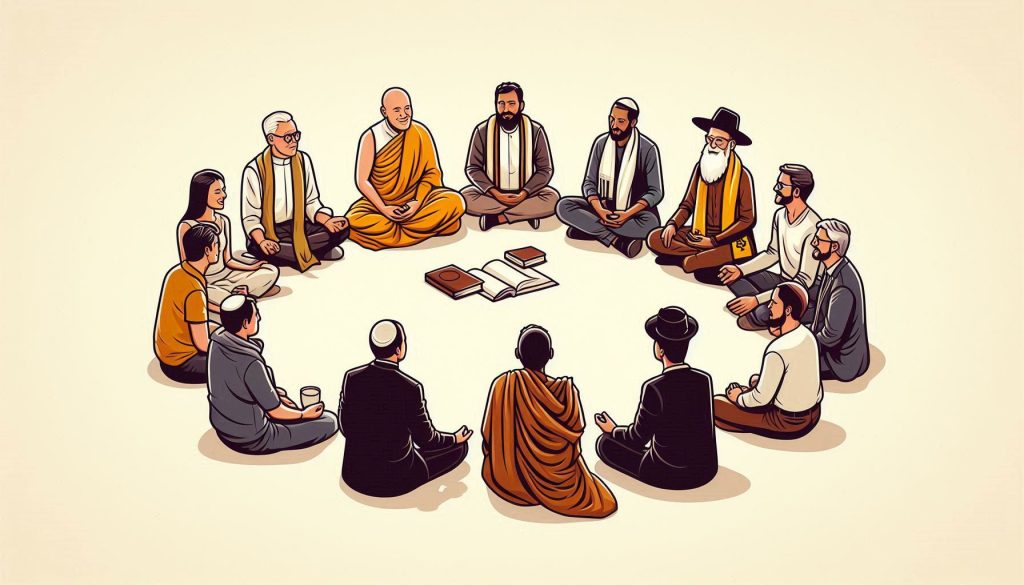Understanding Secularism – Complete Guide For Class 8 Civics Chapter 2

Our learning resources for the chapter, “Understanding Secularism” in Civics for Class 8th are designed to ensure that you grasp this concept with clarity and perfection. Whether you’re studying for an upcoming exam or strengthening your concepts, our engaging animated videos, practice questions and notes offer you the best of integrated learning with interesting explanations and examples.
The chapter ‘Understanding Secularism’ from the Class 8 Civics NCERT book is a crucial part of the curriculum that delves into the concept of secularism as practiced in India. The chapter ‘Understanding Secularism’ outlines the need for secularism in a diverse country like India, highlighting its key features and importance in maintaining harmony. By examining the chapter ‘Understanding Secularism’, students learn about the constitutional provisions that ensure religious freedom and equality, and the role of the state in upholding secular principles.
Objectives of the Chapter
Now that we understand the importance of studying this chapter, let’s explore the objectives behind ‘Understanding Secularism’.
- To comprehend the definition and significance of secularism in a diverse society.
- To understand the necessity of maintaining a distance between religion and government affairs.
- To explore the unique model of secularism practiced in India and its constitutional basis.
- To learn about how the Indian state interacts with and regulates religious practices to ensure equality and justice.
Let’s now understand the various sections of the chapter in detail.
First of all, to understand the concept of secularism, let us delve into the section ‘What is Secularism?’ of the chapter ‘Understanding Secularism’.
What is Secularism?
- The chapter begins by defining secularism as the principle of separating religion from governmental institutions and ensuring that no religion is given preferential treatment.
- Secularism is essential in preventing religious discrimination and promoting equality among all citizens, regardless of their faith.
- This section explains how secularism supports a pluralistic society where diverse religious beliefs can coexist peacefully.
The section ‘What is Secularism?’ in the chapter ‘Understanding Secularism’ covers several key points. Let’s now understand about these.
- Definition of Secularism:
Secularism is the principle of keeping religion separate from governmental institutions, ensuring that no religion receives preferential treatment. This principle aims to provide equal treatment for all religions, protect individual religious freedoms, and promote a harmonious coexistence of diverse beliefs within a society.
- Equal Treatment of All Religions:
Secularism ensures the state treats all religions equally, preventing any discrimination based on religious beliefs. This principle promotes fairness and protects individual rights, allowing people to practice their faith freely without state interference or favoritism, thereby fostering a harmonious and inclusive society.
- Protection of Individual Religious Freedom:
Secularism guarantees individuals the freedom to practice, profess, and propagate their religion without fear of persecution. It ensures that everyone can follow their beliefs openly and without state interference, promoting religious liberty and protecting individuals from discrimination and oppression based on their faith.
- Promotion of Religious Harmony:
Secularism aims to foster an environment where diverse religious beliefs can coexist peacefully and harmoniously. Ensuring that no religion is favored over others, promotes mutual respect and understanding among different faiths, contributing to social cohesion and preventing religious conflicts.
- Prevention of Religious Domination:
Secularism safeguards against the dominance of any one religion over others, maintaining a balanced and fair society. By ensuring that no single religion holds sway, it promotes equality and prevents religious discrimination, thereby supporting a just and inclusive community.
Now, in order to understand the necessity of separating religion from government, let us delve into the section ‘Why is it Important to Separate Religion from the State?’ of the chapter ‘Understanding Secularism’.
Why is it Important to Separate Religion from the State?
- This section emphasizes the importance of keeping religion and state affairs distinct.
- It discusses the potential for conflict and discrimination if one religion is favored over others.
- By maintaining this separation, the state ensures that all individuals have the freedom to practice their religion without interference or favoritism, fostering an environment of mutual respect and tolerance.
Why is it Important to Separate Religion from the State?
The chapter ‘Understanding Secularism’ covers several key points on why is it Important to Separate Religion from the State. Let’s now understand about these.
- Prevents Religious Discrimination:
Separating religion from the state ensures that no religion is favored, preventing discrimination against any religious group. This promotes equality and protects minority religions from marginalization.
- Protects Individual Freedom:
By keeping religion and state affairs distinct, individuals are free to follow their personal religious beliefs without state interference. This separation safeguards personal liberties and religious diversity.
- Ensures Fair Governance:
Separation of religion and state ensures that government policies and decisions are made based on secular principles, promoting fairness and impartiality. This prevents religious biases from influencing public policy.
- Promotes Social Harmony:
Keeping religion out of state affairs reduces the potential for religious conflicts and tensions. This separation fosters a peaceful coexistence of different religious communities within society.
Now, in order to understand the unique approach to secularism in India, let us delve into the section ‘What is Indian Secularism?’ of the chapter ‘Understanding Secularism’.
What is Indian Secularism?
- Indian secularism is unique in its approach, aiming to maintain a principled distance between religion and the state while also recognizing the role of religion in public life.
- This section delves into the constitutional provisions that underpin Indian secularism, such as the Preamble, Fundamental Rights, and Directive Principles.
- It highlights how the Indian model allows for religious freedoms while preventing the dominance of any single religion.
The section ‘What is Indian Secularism?‘ in the chapter ‘Understanding Secularism’ covers several key points. Let’s now understand about these.
- Prevents Religious Discrimination:
Separating religion from the state ensures that no single religion is given preferential treatment, thereby preventing discrimination. It promotes fairness by ensuring that all religions are treated equally, which is essential for a diverse and pluralistic society.
- Protects Individual Freedom:
The separation safeguards individuals’ rights to practice their religion freely without state interference. This ensures that personal religious beliefs are respected and that people can follow their faith without fear of government coercion or restriction.
- Ensures Fair Governance:
By keeping religion out of government decisions, policies are formulated based on secular principles rather than religious biases. This promotes impartiality in governance and helps in making decisions that are fair and inclusive for all citizens.
- Promotes Social Harmony:
When religion and state functions are separated, it reduces the likelihood of religious conflicts and tensions. This separation helps maintain peace and promotes harmonious relations among various religious communities, contributing to a stable and cohesive society.
Now, in order to understand the role of the Indian state in managing religious affairs, let us delve into the section ‘How the Indian State Intervenes in Religious Matters’ of the chapter ‘Understanding Secularism’.
How the Indian State Intervenes in Religious Matters
- Despite the principle of separation, there are instances where the Indian state intervenes in religious matters to ensure justice and equality.
- This section provides examples of such interventions, such as the abolition of untouchability, regulation of religious institutions, and the promotion of social reforms within religious communities.
- It illustrates how these actions are aimed at protecting individual rights and promoting social harmony.
The section ‘How the Indian State Intervenes in Religious Matters ‘ in the chapter ‘Understanding Secularism’ covers several key points. Let’s now understand about these.
- Regulation of Religious Institutions:
The state regulates religious institutions to ensure they operate within legal frameworks and adhere to public laws. This includes oversight on financial management and adherence to regulations, aiming to prevent misuse of resources and ensure transparency.
- Abolition of Social Inequalities:
The state intervenes to address social inequalities perpetuated by religious practices, such as caste discrimination. By implementing reforms and laws, the state aims to eradicate practices that perpetuate social injustices and promote equality within religious communities.
- Promotion of Social Reforms:
The government may support social reforms within religious communities to address issues like gender inequality or child marriage. State intervention helps modernize practices and ensures that all citizens benefit from progressive social changes.
- Legal Framework for Religious Freedom:
The state provides a legal framework to protect religious freedoms while ensuring that practices do not infringe on the rights of others. This balance helps maintain respect for religious diversity while upholding individual rights and public order.
Now that we have discussed the whole chapter, let us know the overall learning value of the chapter ‘Understanding Secularism’.
Overall Learning Value of the Chapter
By exploring the chapter ‘Understanding Secularism’ from the Class 8 Civics NCERT book, students gain a deep understanding of the significance of secularism in India. This knowledge is crucial for appreciating how secular principles help maintain social harmony and protect the rights of all citizens in a diverse and multi-religious society.
Practice questions on Chapter 2 - Understanding Secularism
Get your free Chapter 2 - Understanding Secularism practice quiz of 20+ questions & detailed solutions
Practice Now








